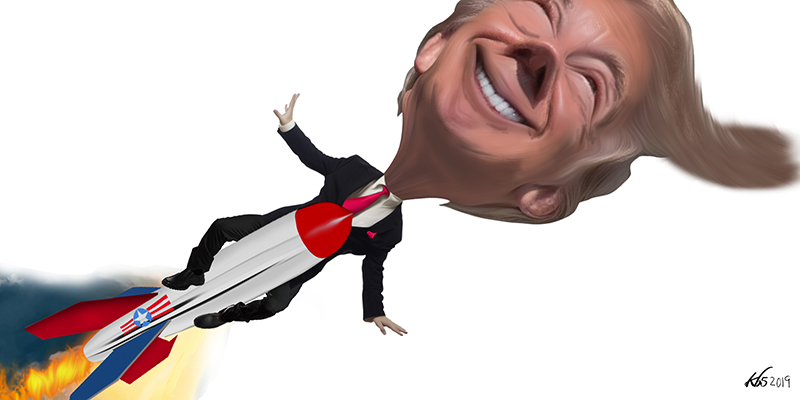Nationalist scholarship has it that every national group across the space of time and place is more or less a successful melting pot where diverse population groups are merged, acculturated, and eventually assimilated. This process occurs at different rates and in different ways, depending on each population group’s place in the political and socio-economic systems. Successful nationalist projects always produce a nationalist myth, portraying the origin, place, and mission of the nation in the global scheme of things.
For instance, the history of race and ethnicity in the United States has been fraught with tension, rivalry, and conflict. The English arrived on the continent, not as immigrants entering a foreign society forced to acquire a new national identity, but as a colonial vanguard keen on recreating a New England in the image of the England they had left behind. From the beginning, they were the predominant ethnic group. They enjoyed a political and cultural hegemony over the life of the American nation-in-the-making.
The non-English populations that followed, namely, the Dutch, the French, the Germans, the Irish, the Italians, the Poles, and the Russians, were regarded as aliens forced to adapt to English rule in terms of both politics and culture. The establishment of English as the American lingua franca was thus a critical first step in the gradual assimilation of the multiple ethno-racial groups of the so-called colonial era in the American nationalist project. These non-English immigrants were a major source of labour originally imported to populate the American landmass, and later to provide cheap labour for industrial development as indentured labourers. As indentured servants, however, they were both scarce and expensive. Moreover, as contract labourers, they could bargain for acceptable terms and entered the ranks of free labour once their contracts expired.
This is the genesis of slavery as the second source of ethnic pluralism in the United States with the forced importation of more than half a million Africans. The system of chattel slavery was more expedient and more profitable for the southern plantation owners. Whereas the indentured servant from Europe expected land at the end of his contract, the African slaves – who were conspicuous by their skin colour and ignorant of the white man’s ways and language and who had been abducted from their homeland and forced into perpetual servitude in a strange land – could be kept permanently in servitude, divorced from the land they worked. Racial differences were utilised to rationalise slavery and to exact resignation and complete mechanical obedience akin to a plough-ox or cart-horse.
The third ethnic pluralism in the United States was originally rooted in conquest. Native Americans were systematically uprooted, decimated, and banished to reservation wastelands. The Mexicans in the southwest were conquered and their land annexed by an expansionist nation under the rationale of “manifest destiny”. The warfare against the American Indians, which included broken treaties, expropriation of their land, rebellion and ultimate defeat, was based on the stereotype of Indians as nomadic hunters and “uncivilized savages”. As one early seventeenth-century document put it: “Savages have no particular propertie in any part or parcell of that country, but only a general residencie there, as wild beasts have in the forests” (sic). Their land was thus taken and they were herded to reservations, where they still remain, crippled with poverty, hunger, disease, and wanton neglect. If the American Indian was the nation’s first minority, the future did not bode well for the many minorities that followed.
In spite of America’s brutal and convoluted history, the American nationalist myth constructs the United States as a deep comradeship of middle class society – as a land of liberty and opportunity; a shining city on a hill; a beacon of hope for the oppressed. America is characterised as a land of the free and home of the brave. Seymour Martin Lipset, a foremost American nationalist scholar, argues that whereas societies like the British, Canadians, French, and Germans are rooted in a history of nationality related to community as a basis of their legitimacy, American society is defined by ideology. Being an American is an ideological commitment rather than a matter of birth.
In spite of America’s brutal and convoluted history, the American nationalist myth constructs the United States as a deep comradeship of middle class society – as a land of liberty and opportunity; a shining city on a hill; a beacon of hope for the oppressed.
American society is organised around an ideology that embraces a set of dogmas about the nature of a good society. The American creed is summed up in four words: anti-statism, egalitarianism or meritocracy, individualism, and populism. Americanism is thus regarded as a highly attenuated, conceptualised, platonic, impersonal attraction toward a system of ideas, a solemn assent to a handful of final notions, including democracy, liberty, and opportunity, to all of which the American is said to adhere rationalistically as a socialist adheres to socialism. The most ardent American nationalist is wont to cry out: “Give me liberty or give me death!” Indeed, the state slogan of New Hampshire, one of the thirteen founding colonies of the union declares: “Live Free or Die!”
Accordingly, virtually every American president, from the most conservative Republican to the most progressive Democrat, has historically embraced this idealised notion of the United States, which has defined their behaviour both at home and abroad. Every American president prior to Donald Trump (at least since the twentieth century) has viewed the global role of the U.S. as the promotion of democracy, human rights, and liberty by persuasion and the power of example where possible, or by coercion and force of arms where necessary. The notion of the U.S. as a land of the free and home of the brave, as a shining city on a hill, a beacon of hope for the oppressed, and a place where “freedom rings” has provided American leaders with the moral authority to demand the same for oppressed peoples around the world.
The emergence of Donald Trump, however, has had the effect of upending and disrupting this state of affairs. Trump’s actions and behaviour both at home, and especially abroad, have negated the very essence of the ideals upon which the American nationalist myth is constructed, with serious implications for the standing of the U.S. both domestically and internationally. Of the four concepts upon which the American creed is constructed, Trump’s onslaught has been focused on three – anti-statism, egalitarianism/meritocracy, and populism.
How has Trump’s behaviour effectively subverted these concepts and what are the implications of this subversion?
The emergence of Donald Trump, however, has had the effect of upending and disrupting this state of affairs. Trump’s actions and behaviour both at home, and especially abroad, have negated the very essence of the ideals upon which the American nationalist myth is constructed, with serious implications for the standing of the U.S. both domestically and internationally.
The first key value representing Americanism is anti-statism. The argument here is that the American Revolution weakened the social values of an organic community and strengthened individualistic and anti-statist ones. The U.S. is deemed to be dominated by pure bourgeois and individualistic values. The U.S. is posited as having been born in the spirit of revolution against a government perceived to be tyrannical. Its anti-tyrannical bias was written into the constitution as the separation of powers, to ensure that no executive would ever again become too powerful. The weakness of the state and the emphasis on constitutionally-mandated division of powers hands lawyers a uniquely powerful role in America and make its people exceptionally litigious.
President Trump’s assault on the notion of separation of powers is manifested in his demand that the Department of Justice, especially its head, the Attorney General, should serve as the president’s personal lawyer and protector rather than as a public defender and protector of the rule of law. When Attorney General Jeff Sessions recused himself from overseeing the Special Counsel investigation into Russia’s meddling in the 2016 U.S. presidential elections, Trump went ballistic and eventually sacked him, arguing that he would not have appointed him had he known he was going to recuse himself from the Robert Muller investigation. Indeed, if Trump had his way, he would want all governmental powers concentrated in his office.
Trump has displayed a fondness for authoritarian leaders, such as Russia’s Vladimir Putin, North Korea’s Kim Jong Un, and the Philippines’s Rodrigo Duterte, who he considers as strong leaders who have strong control over their countries. This betrays his craving for similar powers – like the ones he enjoyed as the all-powerful head of the Trump Organization. Unlike his predecessors, President Trump finds himself stymied and frustrated by the constraining effects of the institutional limits on the U.S. presidency.
The second value that defines Americanism is meritocracy or egalitarianism. American egalitarianism is defined as equality of respect and opportunity. Equality of respect places emphasis on egalitarian social relations and the absence of the demand that those in the lower social order give overt deference to those in the upper classes. Equality of opportunity stresses meritocracy and equal opportunity for all to rise economically and socially. The practical impact of this principle has been a reinforcement of social etiquette, empathy, and compassion in inter-personal relations.
President Trump has subverted this principle, dismissing it as an unnecessary baggage of political correctness. This was on display right from the start of his candidacy for president when he went on to derogatorily refer to Mexican immigrants as rapists who bring drugs and social problems to the U.S.
Uncharacteristic of any and all public figures in American politics, Trump has also taken to insulting and bullying his political opponents. Those he does not see eye to eye with bear the brunt of insulting sobriquets. During the 2016 Republican Party Presidential primaries, Marco Rubio became “Little Marco”, Ted Cruz became “Lying Ted”, Jeb Bush earned the nickname “Low Energy Bush”, while Hillary Clinton was branded “Crooked Hillary”.
Trump’s does not just insult his opponents, but even those within his inner circle who get a taste of his wrath when they fall out with him. Former Secretary of State, Rex Tillerson, went from being “a world class dealmaker” who would “be a star” at the time of his appointment to “dumb as a rock” and “lazy as hell” upon his sacking. Steve Bannon, Trump’s campaign manager who briefly became the White House Chief Strategist, was once described by the president as “tough and smart” but then became “Sloppy Steve” who had “lost his mind” after he was extensively quoted in a book critical of the president. Omarosa Manigault Newman went from “loyal friend” to “not smart”, “low life” and “whacky Omarosa”. Following his recusal, the president mocked Attorney General Jeff Session by calling him “mentally retarded”, “a dumb southerner”, and “Mr. Magoo” (a cartoon character).
Uncharacteristic of any and all public figures in American politics, Trump has also taken to insulting and bullying his political opponents. Those he does not see eye to eye with bear the brunt of insulting sobriquets. During the 2016 Republican Party Presidential primaries, Marco Rubio became “Little Marco”, Ted Cruz became “Lying Ted”, Jeb Bush earned the nickname “Low Energy Bush”, while Hillary Clinton was branded “Crooked Hillary”.
Populism as an American value is elaborated as the belief that the will of the people should dominate the elites, that the public choice is superior to professionalism. This is institutionally reflected in the early extension of the suffrage to all white males. Subsequently, it was reflected in the passage of the sixteenth amendment providing for the popular election of senators, in the direct election of judges in state and local jurisdictions, in the emergence of the primary system of nominating candidates for public office, in the judicial procedure of trial by a jury of one’s peers, and in the diffusion of the use of a referendum and public opinion surveys.
Central to this is the importance of a free media and freedom of expression. President Trump has sought to subvert this through his morbid dislike for media reports that are critical of him and his policies, declaring any and all news he doesn’t like as “fake news” and going so far as labeling the press “an enemy of the people”. This kind of rhetoric is usually associated with authoritarian leaders rather than with leaders of the so-called free world. Indeed, no other American president, despite their feelings of being unfairly criticised by the media, has ever gone after the media this brazenly.
President Trump’s subversion of American nationalist ideology has had major implications both nationally and internationally. At the national level, by talking up strongman tactics, derogatorily dismissing his political opponents, and dismissing the media as an enemy of the people, Trump helps shape the character and behaviour of Americans, especially his most ardent supporters, in a way that doesn’t augur well for a democracy like the U.S. His behaviour has emboldened white supremacists. The direct results of this include the mailing of pipe bombs to key Democratic Party leaders and a media house in October 2018 and the racist Unite the Right rally in Charlottesville, Virginia in August 2017. The president’s equivocation in condemning the rally, which turned violent resulting in one fatality, made matters worse. The white supremacists now see in him an ally in the White House. Indeed, White nationalist leader, David Duke, thanked President Trump for his “courage and honesty” in blaming the violence in Charlottesville, Virginia, on the alt-left.
President Trump’s subversion of American nationalist ideology has had major implications both nationally and internationally. At the national level, by talking up strongman tactics, derogatorily dismissing his political opponents, and dismissing the media as an enemy of the people, Trump helps shape the character and behaviour of Americans, especially his most ardent supporters, in a way that doesn’t augur well for a democracy like the U.S.
At the international level, Trump’s jettisoning of American exceptionalism has had him commit to withdrawing the U.S. from leadership of the world. He has questioned the existence of NATO and demanded that other members step up their defence spending. He constantly berates his generals about what the U.S. is doing in Afghanistan, in Iraq, in Syria, and even in South Korea and has declared he wants out of these places. In other words, the impact of Trumpism is American retreat from global leadership under the guise of “America First”, and an end to U.S. commitment to spreading democracy, civil and political liberties, and human rights across the globe. Furthermore, Trump’s rhetoric and style have helped embolden authoritarian leaders around the world. They have been afforded the leeway to harass the opposition and the mass media without fear of sanction from the so-called leader of the free world.
In the final analysis, when Barack Obama won the U.S. presidency in 2008, Trump was on the forefront of the birther movement that sought to delegitimise the Obama presidency by insinuating that he was un-American, Kenya-born, a foreigner who had conned his way to the presidency. Paradoxically, by subverting the key elements of American nationalist ideology that has formed the bedrock of American exceptionalism, Trump is proving, so far, to be the most un-American of American presidents.








